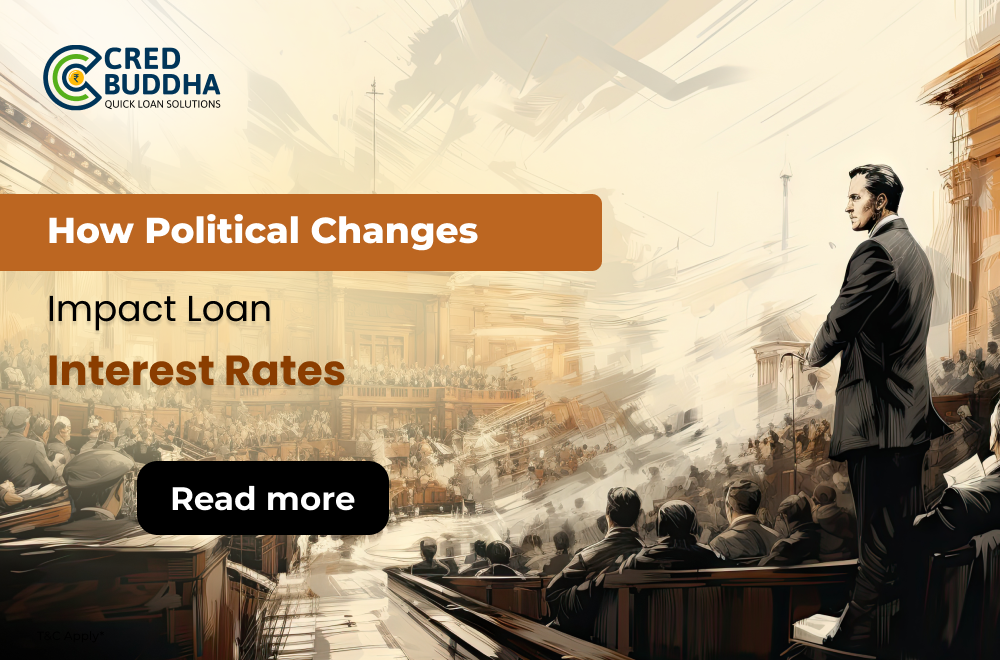
How Political Changes Impact Loan Interest Rates
How Political Changes Impact Loan Interest Rates
Think of loan interest rates as mood swings. Sometimes they’re calm and steady, other times they spike out of nowhere. And who’s pulling the emotional strings? Politics.
Yes, the very elections, policies, and speeches you hear on the news can quietly sneak into your bank statement. From the Prime Minister’s budget to a sudden global conflict, politics has a way of deciding how much you’ll pay for your next loan.
Let’s decode this fascinating love-hate story between politics and interest rates—without the jargon.
Politics and Your EMI: An Odd Couple
Every government has a financial personality. Some behave like generous relatives at a wedding—spending freely, showering everyone with goodies. Others act like strict accountants, tracking every paisa, cutting back to maintain balance.
Now, when the “spenders” take charge, central banks often cut interest rates so people borrow more and the economy booms. When the “savers” step in, rates climb higher to control inflation.
Your EMI, unknowingly, is always dancing to their tune.
Election Time: More Drama Than Netflix
Elections are like binge-worthy dramas. The suspense is high, the characters are colourful, and everyone’s waiting for the final twist. But behind all the noise, something else is happening—financial uncertainty.
Banks and investors usually hit pause. Central banks avoid rocking the boat, keeping rates stable until the dust settles. But once the results are out? That’s when the real moves begin.
If a pro-growth government steps in, you might see cheaper loans. If the new rulers focus on cutting debt, brace yourself for pricier EMIs.
Your loan, in a way, gets its own election results.
Policies: The Domino Effect You Can’t Ignore
Government policies are like dominos—tip one, and the rest come tumbling down.
Say the government announces a massive tax cut. Suddenly, people have more money. They spend more, borrow more, and inflation rises. The RBI responds with—you guessed it—higher interest rates.
Or picture subsidies for housing. Demand for home loans shoots up, banks get busy, and interest rates adjust to keep balance.
Even government borrowing matters. When the state borrows big for infrastructure, it competes with you for funds, nudging loan rates upward.
So, those “boring” policy announcements? They’re actually reshaping the numbers on your EMI slip.
Global Politics: When the World Knocks on Your Door
Here’s the kicker: it’s not just about Delhi or Mumbai. Your loan is tied to the world.
A conflict in the Middle East sends oil prices soaring? Inflation in India spikes, and the RBI hikes rates. A trade war between the US and China? Global markets shake, currencies wobble, and your personal loan rate quietly shifts.
It’s like being in a WhatsApp group you never joined—global politics keeps messaging you whether you like it or not.
RBI: The Referee Under Pressure
Think of the Reserve Bank of India as a cricket umpire. The players (politicians) want the game tilted in their favor. But the umpire has to keep things fair.
Governments love low interest rates—it makes borrowing cheaper, businesses happier, and voters smile. But if inflation rises, RBI has to play tough, even if it makes the crowd boo.
This push and pull explains why predicting loan rates feels like predicting monsoon rains—everyone has an opinion, but the clouds decide.
Why Should You Care?
Because timing matters.
Lock in a fixed-rate home loan before rates climb, and you save lakhs over the years. Choose a floating loan right before a rate hike, and suddenly your “manageable” EMI feels like a financial treadmill.
Politics isn’t just news—it’s background music to your financial life. And knowing the rhythm helps you dance better.
Should You Wait for the “Perfect” Moment?
Here’s the truth: waiting for politics to settle before borrowing is like waiting for traffic in Mumbai to disappear—it’s not happening.
Interest rates will always rise, fall, or wobble. Instead of waiting endlessly, the smarter move is to understand your loan needs, weigh fixed vs. floating, and make decisions that give you breathing space no matter what politics does next.
The Road Ahead
If one thing is certain, it’s that politics will keep changing and interest rates will keep responding. Elections, budgets, international crises—they’re all part of the cycle.
Your job isn’t to control it—it’s to prepare for it. Like checking the weather before stepping out, keep an eye on political and economic winds. Carry the financial umbrella, and you’ll stay dry no matter how stormy it gets.
Here’s where CredBuddha enters—not as another financial tool, but as your anchor in the storm.
While politics stirs up uncertainty, CredBuddha simplifies the chaos. It compares loans, breaks down options, and points you toward the best path—so you’re never left guessing. Think of it as your personal finance GPS, rerouting you whenever politics throws a roadblock.
With CredBuddha, you don’t just react to interest rate swings—you stay ahead, borrowing smartly and saving big, no matter who’s making speeches or passing policies.
FAQs
1. Do political changes always affect loan interest rates?
Not always, but big shifts in leadership or policy often cause changes.
2. How do elections impact my loan?
Elections bring uncertainty. Once policies roll out, rates may rise or fall.
3. Can global politics affect EMIs in India?
Yes—oil prices, sanctions, and trade wars often push inflation and rates up.
4. Who sets interest rates in India?
The RBI sets the repo rate, which banks use to adjust lending rates.
5. Is fixed better than floating during political shifts?
Fixed protects against hikes, while floating benefits if rates drop.
6. Does government borrowing impact my loan?
Yes. Heavy borrowing raises demand for funds, pushing rates up.
7. How does CredBuddha help in uncertain times?
It compares loan options in real-time and ensures you choose wisely, even in volatile conditions.